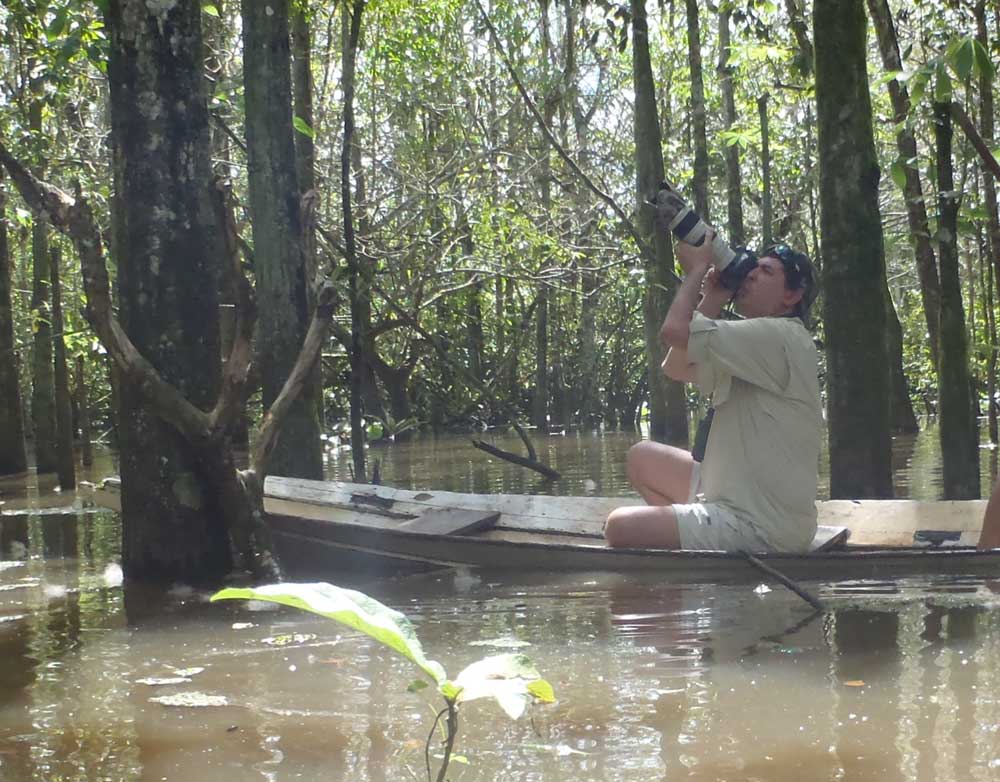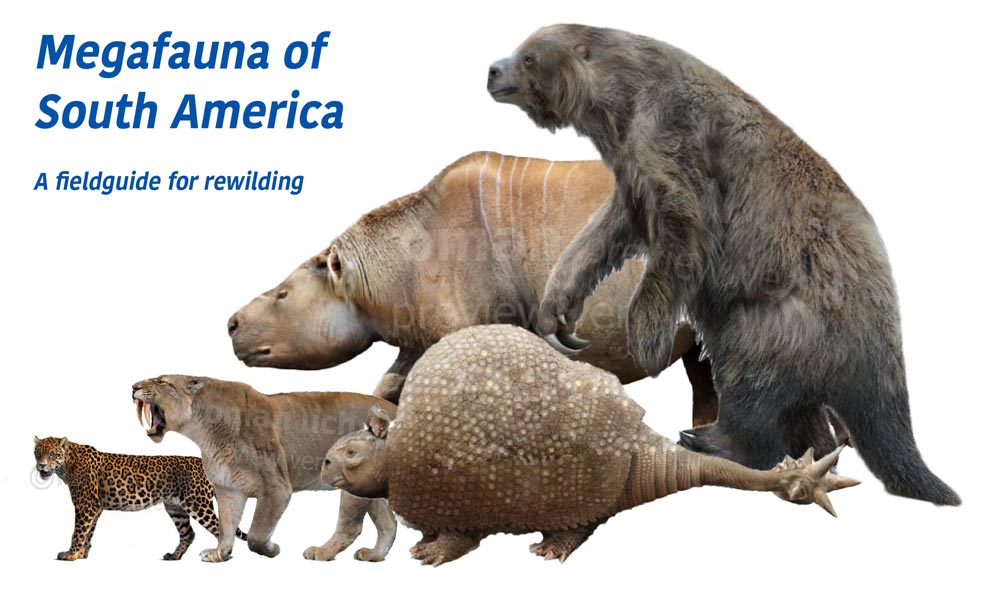Alberto Campos
After decades working with environmental NGOs in the largest neotropical dry forest ecoregion in the world (in the Brazilian Caatinga), for his PhD work, Alberto collaborates with Annapurna Agricultura Ltd to create a a real life 'rewilding reserve', a private nature reserve aimed at restoration and rewilding, and a large agroforestry zone to explore plant forest resources in regenerative ways.
Research description
My doctoral research will initially investigate the possibilities of restoring key ecological interactions, such as seed dispersal, in the Brazilian Caatinga, the largest neotropical dry forest ecoregion (Chapter 1). I expect to consolidate a publication (e-book) illustrating the recent (i.e., Late Holocene) megafauna of South America, including aspects to support more informed rewilding processes (e.g., ecosystem roles and functions, body mass, living relatives). I will conduct fieldwork to evaluate present seed dispersal dynamics by existing wildlife and the viability of domesticated herbivores (i.e., cattle, horses) as seed dispersers for megafauna fruit (Chapter 2). Field data will be used to calibrate an ecological model to support rewilding decision-making (e.g., species selection, baselines, indicators) and provide a framework for more informed processes (Chapter 3). I expect to go beyond the traditional academic research by applying the proposed framework to the study site, creating a real-life “rewilding reserve” (Chapter 4) that will not just advance our knowledge on the design and monitoring of landscape-scale restoration processes, but also contribute to the development of regenerative production systems. To achieve this, a collaboration has been established with Annapurna Agricultura Ltd (the Brazilian subsidiary of an organic agriculture company based in The Netherlands) to allow me to conduct research in one of their largest farms (11,000 ha) in Brazil. Our mutual goal is to create a private nature reserve (aimed at restoration and rewilding) and a large agroforestry zone to explore plant forest resources (i.e., fruit, bark, seed, fiber, wax) in regenerative ways (e.g., non-destructive harvesting, soil cover, seed dispersal, partial harvest).
What does being a Public Scholar mean?
Being a Public Scholar means translating and sharing scholarly research to a broader segment of society, while testing and applying this knowledge to resolve real-life demands.
In what ways do you think the PhD experience can be re-imagined with this Initiative?
I think the PhD experience can be greatly expanded with the PSI through the program’s connections and bridges that enable and motivate us to show our research-with-a-purpose to a broader audience, and the synergies that may arise.
How do you envision connecting your PhD work with broader career possibilities?
My PhD work is directly related to career opportunities in developing long-term regenerative systems associate with low-input, organic agricultural systems. As part of my fieldwork and research outputs, I will be delivering a proposal for the creation of a real protected area associated with the organic production of certified honey, for a multinational company operating in Brazil. If successful, these methods may be replicated to other of their properties in South America, and provide career possibilities that are aligned with my personal mission of protecting biodiversity while developing sustainable forms of natural resource use.
How does your research engage with the larger community and social partners?
Guided by participatory processes, my research is expected to engage with most of the local social actors and stakeholders, from the communities living around the farm that will have access to the agroforestry portion of the regenerative system, to municipal authorities and state environmental agencies that issue and enforce permits, and the large team of farm workers that conduct agroforestry and honey production activities.
Why did you decide to pursue a graduate degree?
I’ve decided to pursue a graduate degree to be able to amplify my contribution for the conservation of biodiversity and natural ecosystems, and for the development of more sustainable land use practices. After conducting hands-on conservation projects with highly endangered species and habitats for several years, I’ve decided to bring my practical experiences and empirical knowledge to another level with rigorous scientific methods, but also the learning, mind-opening and creative opportunities that academic life can provide.
Why did you choose to come to British Columbia and study at UBC?
I’ve decided to study at UBC because of a combination of academic excellence in a progressive and culturally rich environment, surrounded by an invigorating natural setting. Professor Kai Chan’s multidisciplinary group and approach, in terms of connecting human and natural systems, has been the main reason influencing my decision to study at UBC. His holistic research approach has taken my former ideas to new levels, exploring different dimensions of sustainability, their inter-relationships, and synergies.
What is it specifically that your program offers that attracted you?
What specifically attracted me to the program of the Institute for Resources, Environment and Sustainability (IRES) was its multidisciplinarity and social-ecological approach to conservation and sustainability issues. The IRES program offers a unique balance between natural and social sciences, a combination of different disciplines and methods rarely seen in academia, all converging to bridge human and natural systems in more productive and fulfilling ways.
For you, what was the best surprise about graduate life, about UBC or life in Vancouver?
The best surprise about UBC has been exploring the beautiful Point Grey campus and its surroundings, including the beaches, parks and Pacific forests. It is a lively and diverse international community, and I was also positively surprised by everyone’s respectful and accommodating attitude.
What aspect of your graduate program do you enjoy the most or are looking forward to with the greatest curiosity?
At the moment, I’ve been enjoying very much to be able to read and organize my research literature for the doctoral comprehensive exam. This immersion has been allowing me to make connections between different disciplines and various lines of thinking, bridging gaps between natural and social sciences, while searching for informed and innovative ways to develop my rewilding research.
What do you see as your biggest challenge(s) in your future career?
In my future career, the biggest challenges will probably be related to developing and strengthening the social-ecological structures and agreements that will allow my academic research to be translated into practical solutions for improving ecosystem functions and thus providing more and better ecosystem services for people and the biosphere in the long run.
How do you feel your program is preparing you for those challenges?
To better prepare me for those future challenges, my program has been offering me an amazing multidisciplinary research environment supported by courses, seminars, ‘real-life’ case studies, workshops and lab meetings. Besides, the support from my Lab group and supervisor has been instrumental in gently pushing me forward, enriching my research proposal and helping to foresee future challenges.
What aspects of your life or career before now have best prepared you for your UBC graduate program?
The many years of experience working as a conservation biologist facing real-life situations in the field have prepared me to better understand the complexity of social-ecological interactions that have to be considered in a long-term conservation effort. These have been important to inspire and support my theory of change, while refining my research proposal.
What do you like to do for fun or relaxation?
My main hobby and one that gives me a great sense of relaxation after an intense day’s work is what I call ‘birdwalking’, which means going for long walks while observing birds and wildlife in general. In this way, I can combine two of my outdoor passions: hiking and photographing wildlife.
What advice do you have for new graduate students?
I’d advise new grad students to fully enjoy what UBC and Vancouver have to offer. UBC offers innumerous and valuable resources for incoming students, from financial and health counselling to tax workshops and bike-sharing opportunities. Make sure you explore and benefit from this amazing support. But also try to balance your research efforts with immersions in the surrounding nature and the many outdoor leisure activities that the UBC campus and the city of Vancouver have to offer.






